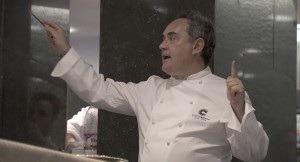
The food world was startled when Spanish uber-chef Ferran Adrià announced that El Bulli, his temple to haut cuisine and five-times best restaurant in the world, would be serving its last mind-bending supper in July 2011. Although dispensing with the diners might seem an odd move for a chef, it makes sense after watching German director Gereon Wetzel’s documentary El Bulli: Cooking in Progress. Shot from 2008 to 2009, the film is a year in the life of Adrià and his chefs. And it portrays a chef-cum-artist for whom the logical next step is his proposed culinary think tank (due to open in 2014), rather than a restaurant that serves dinner.
The film opens as the whitewashed El Bulli, sunk into a craggy Costa Brava cove, is shuttered for the 2008 season. Over the previous six months, eight thousand diners have been served (a fraction of the two million who tried for a table) and now another half a year is needed to invent a new 35-course menu.
The team decamp to their Barcelona lab where a crew of three (led by Adrià’s right-hand-man Oriol Castro) get to work on a sweet potato. Slicing, steaming, juicing, frying and vacuumizing, they subject it to every culinary and extra-culinary process possible. Results are photographed, notes are taken, everything is logged into computers. They talk as they work, free-associating what the root crop could become. Could it be a meringue? Successful experiments are set aside. “Ferran will try it when he gets here.”
When the master does appear, the world’s greatest chef doesn’t really seem like a chef at all. Maybe that’s the point. Adrià doesn’t cook a thing in the entire film. Instead he tastes, over and over again, what his lieutenants concoct; biting this, sipping that, his eyes shifting back and forth as his restless brain ticks over. The chefs watch and wait for the verdict. But Adrià usually responds vaguely; a little shrug, a raised eyebrow. Though when he doesn’t like it, you know. “Have you tried this? It’s bad. Never give me anything that’s not good.” And when it’s good, he simply points and says, “This is it.”
Locked in the lab and later the El Bulli kitchen, we get little sense of place, of personal lives or even the passage of time. Wetzel’s film is as airless and monastic as the life of an El Bulli chef. The director simply watches and listens. There’s no real narrative, no narration and no interviews. Which means we only get Adrià’s philosophy in slivers. He tells a visitor that taste doesn’t matter at the experimental stage. And he instructs his new chefs that the more they bewilder the diner, the better.
Occasionally, the film does break out into the real world, to striking effect. One scene follows Oriol and chef Aitor Lozano to market. The boys take their El Bulli logic with them and in a strange and admirable example of precision shopping, ask the green grocer for five grapes. The grocer baulks, asking if Spain’s economic crisis has hit El Bulli too. No, they only need five for their experiments. It’s as if they’ve been cloistered too long and forgotten how the rest of the world works. And it reminds us El Bulli succeeded because it wasn’t interested in how the rest of the world worked.
Vanishing ravioli, anyone?
Once the company returns north and El Bulli opens up for business, we only get glimpses of its customers. Was Wetzel not allowed to approach them, or is the director suggesting their relative importance in the scheme of things? One shot, through a kitchen window, spies four well-heeled diners in the garden before dinner. Laughing and giddy, excited about the meal of their lives, they seem like innocents, about to walk into Adrià’s game of culinary peek-a-boo, about to be served ‘vanishing ravioli’ and a cocktail of water, hazelnut oil and salt.
Does the film work? It’ll disappoint anyone after kitchen high-drama or who’d prefer Adrià sat down with the director and talked. But it does succeed in sketching, albeit elusively, a man passionate about probing the possibilities of food. And it winds up a smart and even inspiring study of the creative process and of Adrià as leader and artist.
The film closes with eye-popping photos, a slideshow of the unearthly dishes that have been months in the conjuring. With names like “Needle Tree”, “Blossom with its Nectar” and “Minted Ice Lake”, they’re edible post-modern art. But after spending two hours in the kitchen of the best restaurant in the world, I realised I didn’t feel hungry at all. I wanted to try Adrià’s food, but to satisfy my curiosity rather than my appetite. I think Adrià would say that’s the point.
Follow James Blick on twitter: @jamesblick78
Leave a Reply
You must be logged in to post a comment.